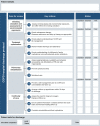Implementing an Evidence-Based COPD Hospital Discharge Protocol: A Narrative Review and Expert Recommendations
- PMID: 37537515
- PMCID: PMC10499689
- DOI: 10.1007/s12325-023-02609-8
Implementing an Evidence-Based COPD Hospital Discharge Protocol: A Narrative Review and Expert Recommendations
Abstract
Discharge bundles, comprising evidence-based practices to be implemented prior to discharge, aim to optimise patient outcomes. They have been recommended to address high readmission rates in patients who have been hospitalised for an exacerbation of chronic obstructive pulmonary disease (COPD). Hospital readmission is associated with increased morbidity and healthcare resource utilisation, contributing substantially to the economic burden of COPD. Previous studies suggest that COPD discharge bundles may result in fewer hospital readmissions, lower risk of mortality and improvement of patient quality of life. However, evidence for their effectiveness is inconsistent, likely owing to variable content and implementation of these bundles. To ensure consistent provision of high-quality care for patients hospitalised with an exacerbation of COPD and reduce readmission rates following discharge, we propose a comprehensive discharge protocol, and provide evidence highlighting the importance of each element of the protocol. We then review care bundles used in COPD and other disease areas to understand how they affect patient outcomes, the barriers to implementing these bundles and what strategies have been used in other disease areas to overcome these barriers. We identified four evidence-based care bundle items for review prior to a patient's discharge from hospital, including (1) smoking cessation and assessment of environmental exposures, (2) treatment optimisation, (3) pulmonary rehabilitation, and (4) continuity of care. Resource constraints, lack of staff engagement and knowledge, and complexity of the COPD population were some of the key barriers inhibiting effective bundle implementation. These barriers can be addressed by applying learnings on successful bundle implementation from other disease areas, such as healthcare practitioner education and audit and feedback. By utilising the relevant implementation strategies, discharge bundles can be more (cost-)effectively delivered to improve patient outcomes, reduce readmission rates and ensure continuity of care for patients who have been discharged from hospital following a COPD exacerbation.
Keywords: Care bundles; Chronic obstructive pulmonary disease; Discharge protocol; Exacerbation; Hospital readmission; Implementation strategies.
© 2023. The Author(s).
Conflict of interest statement
Marc Miravitlles has received speaker fees from AstraZeneca, Boehringer Ingelheim, Chiesi, Cipla, CSL Behring, GlaxoSmithKline, Grifols, Janssen, Kamada, Menarini, Novartis, Specialty Therapeutics, Takeda and Zambon; consulting fees from AstraZeneca, Atriva Therapeutics, Boehringer Ingelheim, Chiesi, CSL Behring, Ferrer, GlaxoSmithKline, Grifols, Inhibrx, Menarini, Mereo BioPharma, Novartis, Novo Nordisk, ONO Pharmaceutical, Palobiofarma S.L, Sanofi, Specialty Therapeutics, Spin Therapeutics, Takeda and Zambon; and research grants from Grifols. Mohit Bhutani has received speaker/consultancy fees from AstraZeneca, Boehringer Ingelheim, Covis, GlaxoSmithKline, Sanofi and Valeo; grants from Alberta Lung, AstraZeneca, Canadian Institute of Health Research, GlaxoSmithKline, Mereo and Sanofi; and is an Executive of the Canadian Thoracic Society. John R Hurst has received speaker/consultancy fees from AstraZeneca, Boehringer Ingelheim, Chiesi, GlaxoSmithKline, Novartis and Takeda. Frits ME Franssen has received speaker/consultancy fees and/or grants from AstraZeneca, Boehringer Ingelheim, Chiesi, GlaxoSmithKline, Merck Sharp & Dohme, Novartis and Teva. Job FM van Boven has received consultancy fees and/or grants from Aardex, AstraZeneca, Chiesi, European Commission COST (COST Action 19,132), GlaxoSmithKline, Novartis, Pfizer, Pill Connect, Teva, Trudell Medical and Vertex (all paid to his institution). Ee Ming Khoo has received speaker/consultancy fees from AstraZeneca and grants from the National Institute for Health Research Global Health Research Unit on Respiratory Health (RESPIRE), and is the President of the International Primary Care Respiratory Group and the Primary Care Respiratory Group Malaysia. Jing Zhang has received speaker/consultancy fees from AstraZeneca, Boehringer Ingelheim, GlaxoSmithKline and Pfizer. Stephen Brunton has received speaker/consultancy fees from AstraZeneca and Boehringer Ingelheim. Daiana Stolz reports grants from The Swiss National Foundation (SNF 189280), and unrestricted grants from AstraZeneca, Boston Scientific, and Curetis AG; as well as honoraria from, and participation on data safety monitoring boards, talks or advisory boards for, AstraZeneca, Berlin-Chemie/Menarini, Boehringer Ingelheim, Chiesi, CSL Behring, Curetis AG, GlaxoSmithKline, Merck, Merck Sharp & Dohme, Novartis, Sanofi and Vifor. Daiana Stolz is the current GOLD representative for Switzerland, the immediate past Education Council Chair of the European Respiratory Society and past President of the Education Committee of the Swiss Respiratory Society. Tonya Winders has received speaker/consultancy fees from Amgen, AstraZeneca, GlaxoSmithKline, Novartis and Sanofi Regeneron. Kazuhisa Asai has received speaker/consultancy fees from AstraZeneca, Boehringer Ingelheim, GlaxoSmithKline, Novartis and Sanofi. Jane E Scullion has received speaker fees and honoraria for attending congresses or educational events from AstraZeneca, Boehringer Ingelheim, Chiesi, Let’s Talk Respiratory, Monthly Index of Medical Specialties, Mundipharma, Napp and Teva.
Figures
References
-
- Global Initiative for Chronic Obstructive Lung Disease (GOLD). Global strategy for the diagnosis, management, and prevention of chronic obstructive pulmonary disease report [Internet]. 2023 [cited 2023 May 13]. Available from: https://goldcopd.org/wp-content/uploads/2022/12/GOLD-2023-ver-1.1-2Dec20...
-
- World Health Organization. Chronic obstructive pulmonary disease (COPD) [Internet]. 2023 [cited 2023 May 13]. Available from: https://www.who.int/news-room/fact-sheets/detail/chronic-obstructive-pul....
-
- Adeloye D, Song P, Zhu Y, Campbell H, Sheikh A, Rudan I, et al. Global, regional, and national prevalence of, and risk factors for, chronic obstructive pulmonary disease (COPD) in 2019: a systematic review and modelling analysis. Lancet Respir Med. 2022;10:447–458. doi: 10.1016/S2213-2600(21)00511-7. - DOI - PMC - PubMed
Publication types
MeSH terms
LinkOut - more resources
Full Text Sources
Medical


